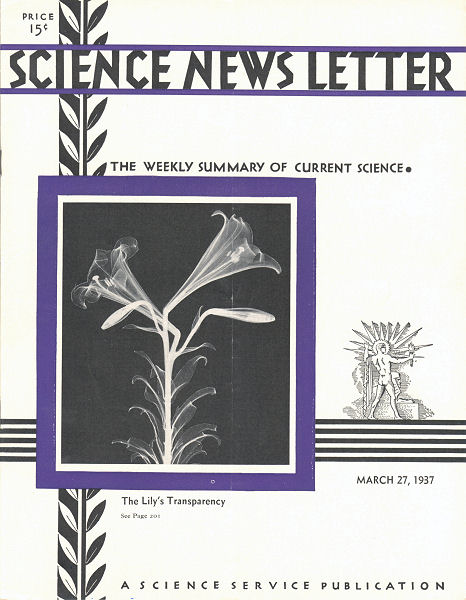From the March 27, 1937, issue

NEW GLIMPSE OF LILY’S BEAUTY WON BY X-RAYS
“Transparency” is a beauty often praised in white lilies, though the term is always recognized to be of figurative rather than literal application. But it is made literally true by a skilled X-ray artist, Miss Francis Mildred Davis, of Santa Monica, Calif. Arrangement of flower parts, even within the unopened buds, and the delicate veining of leaves and petals, are all brought out on her film.
CIVILIZATION FAILS IN PROPER ABSORPTION OF SCIENCE
Dissatisfaction with the manner with which society has met and absorbed scientific changes was expressed in a series of four lectures in Princeton by Dr. Frank Baldwin Jewett, president of the Bell Telephone Laboratories.
Speaking on “An Engineer Looks at the Social Implications of Science,” he said of the government, “the political government, since it must of necessity be organized to do a vast number of things, is less likely to be competent in a highly technical matter such as the development and application than is a private organization designed and operated solely for that scientific purpose.”
Dr. Jewett declared that although the government cannot directly use the services of engineers and scientists “because their field is one in which they can operate with entire absence of certain factors normally present and controlling in other human affairs,” still the government should make more use of the knowledge of these men.
Speaking from an international viewpoint, Dr. Jewett asked, “How will the world of those who wish to retain what they have protect themselves against the degrading effects of those who, equipped with the same tools, are struggling to elevate their standards?”
“One has only to visit the more recent of the vast technical establishments of the Orient, particularly those of Japan, to be acutely conscious of how far the migration of applied science has carried the world since the days of its beginning, and how pregnant with social and political problems the future is.”
To meet these problems, he recommended the inclusion of science training in the education of every student, “with the thought that thereby they and the society they are to form will be better equipped to handle the problems of science and particularly the problems created by science.”
He made a “complete refutation of any claim that applied science has reduced gainful employment,” and citing the automobile industry, which threw out of work many drivers, hostlers, wagon-builders, and farm laborers, he pointed to the mushroom growth of allied industries of the automobile that have in the end increased the total of employed labor.
One evil of science Dr. Jewett showed to be that “frequently the appeal of some new thing is such as to offer a lush field for the get-rich-quick artists or those who pander to the baser sides of human nature.” He added that such exploiters must be safeguarded against, for “we no longer have opportunity to become fully acquainted with a new thing before its mass impact has confronted us with a major problem of social control and legal regulation for which we have no established guides.”







